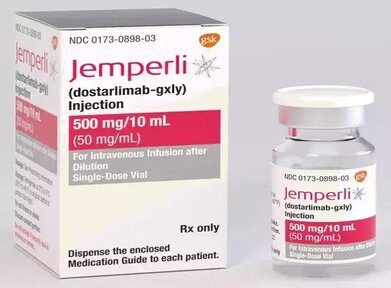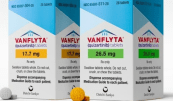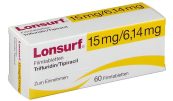Dostarlimab-gxly with chemotherapy is approved by the FDA for endometrial cancer
August 2023: Dostarlimab-gxly (Jemperli, GlaxoSmithKline), followed by dostarlimab-gxly as a single agent, was approved by the Food and Drug Administration for the treatment of primary advanced or recurrent endometrial cancer (EC) that is mismatch repair deficient (dMMR), as determined by an FDA-approved test, or microsatellite instability-high (MSI-H).
RUBY (NCT03981796), a randomised, multicenter, double-blind, placebo-controlled trial, assessed efficacy. A predetermined subgroup of 122 patients with primary advanced or recurrent dMMR/MSI-H EC underwent an assessment of efficacy. When local data were not available, central testing (IHC) utilising the Ventana MMR RxDx Panel was used to assess the MMR/MSI tumour status.
Patients were randomly assigned (1:1) to receive either placebo with carboplatin and paclitaxel, followed by placebo, or dostarlimab-gxly with carboplatin and paclitaxel, followed by dostarlimab-gxly. The aforementioned link provides detailed prescribing information on several chemotherapy regimens. MMR/MSI status, past external pelvic irradiation, and disease stage (recurrent, primary Stage III, or primary Stage IV) were all taken into account when stratifying the randomization process.
Investigator-assessed progression-free survival (PFS) using RECIST v. 1.1 was the main efficacy outcome measure. With a median PFS of 30.3 versus 7.7 months (Hazard Ratio=0.29 [95% CI: 0.17, 0.50]; p-value0.0001) for the dostarlimab-gxly and placebo-containing regimens, respectively, a statistically significant PFS improvement was seen in the dMMR/MSI-H group.
Pneumonitis, colitis, hepatitis, endocrinopathies such as hypothyroidism, nephritis with renal failure, and skin adverse responses are examples of immune-mediated adverse reactions that can occur with dostarlimab-gxly. Rash, diarrhoea, hypothyroidism, and hypertension were the most frequent adverse events (20%) with dostarlimab-gxly in combination with carboplatin and paclitaxel. For a complete list of side effects, refer to the prescribed information.
Dostarlimab-gxly is to be administered at a dose of 500 mg every three weeks for six doses with carboplatin and paclitaxel, then 1,000 mg once every six weeks until the illness progresses or there is intolerable toxicity, which might take up to three years. When given on the same day as chemotherapy, dostarlimab-gxly should be given first.
View full prescribing information for Jemperli.
Dr. Nishant Mittal is a highly accomplished researcher with over 13 years of experience in the fields of cardiovascular biology and cancer research. His career is marked by significant contributions to stem cell biology, developmental biology, and innovative research techniques.
Research Highlights
Dr. Mittal's research has focused on several key areas:
1) Cardiovascular Development and Regeneration: He studied coronary vessel development and regeneration using zebrafish models1.
2) Cancer Biology: At Dartmouth College, he developed zebrafish models for studying tumor heterogeneity and clonal evolution in pancreatic cancer.
3) Developmental Biology: His doctoral work at Keio University involved identifying and characterizing medaka fish mutants with cardiovascular defects.
4) Stem Cell Research: He investigated the effects of folic acid on mouse embryonic stem cells and worked on cryopreservation techniques for hematopoietic stem cells.
Publications and Presentations
Dr. Mittal has authored several peer-reviewed publications in reputable journals such as Scientific Reports, Cardiovascular Research, and Disease Models & Mechanisms1. He has also presented his research at numerous international conferences, including the Stanford-Weill Cornell Cardiovascular Research Symposium and the Weinstein Cardiovascular Development Conference.
In summary, Dr. Nishant Mittal is a dedicated and accomplished researcher with a strong track record in cardiovascular and cancer biology, demonstrating expertise in various model systems and a commitment to advancing scientific knowledge through innovative research approaches.
- Comments Closed
- August 14th, 2023






advanced uterine cancer options, Dostarlimab FDA approval, first-line endometrial treatment, immunotherapy combination therapy, Jemperli endometrial cancer, mismatch repair deficient (dMMR) cancer, PD-1 inhibitor chemotherapy, RUBY trial results
CancerFax is the most trusted online platform dedicated to connecting individuals facing advanced-stage cancer with groundbreaking cell therapies.
Send your medical reports and get a free analysis.
🌟 Join us in the fight against cancer! 🌟
Привет,
CancerFax — это самая надежная онлайн-платформа, призванная предоставить людям, столкнувшимся с раком на поздних стадиях, доступ к революционным клеточным методам лечения.
Отправьте свои медицинские заключения и получите бесплатный анализ.
🌟 Присоединяйтесь к нам в борьбе с раком! 🌟